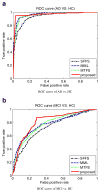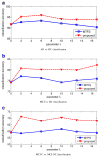Discriminative multi-task feature selection for multi-modality classification of Alzheimer's disease
- PMID: 26311394
- PMCID: PMC4769696
- DOI: 10.1007/s11682-015-9437-x
Discriminative multi-task feature selection for multi-modality classification of Alzheimer's disease
Abstract
Recently, multi-task based feature selection methods have been used in multi-modality based classification of Alzheimer's disease (AD) and its prodromal stage, i.e., mild cognitive impairment (MCI). However, in traditional multi-task feature selection methods, some useful discriminative information among subjects is usually not well mined for further improving the subsequent classification performance. Accordingly, in this paper, we propose a discriminative multi-task feature selection method to select the most discriminative features for multi-modality based classification of AD/MCI. Specifically, for each modality, we train a linear regression model using the corresponding modality of data, and further enforce the group-sparsity regularization on weights of those regression models for joint selection of common features across multiple modalities. Furthermore, we propose a discriminative regularization term based on the intra-class and inter-class Laplacian matrices to better use the discriminative information among subjects. To evaluate our proposed method, we perform extensive experiments on 202 subjects, including 51 AD patients, 99 MCI patients, and 52 healthy controls (HC), from the baseline MRI and FDG-PET image data of the Alzheimer's Disease Neuroimaging Initiative (ADNI). The experimental results show that our proposed method not only improves the classification performance, but also has potential to discover the disease-related biomarkers useful for diagnosis of disease, along with the comparison to several state-of-the-art methods for multi-modality based AD/MCI classification.
Keywords: Alzheimer’s disease; Discriminative regularization; Group-sparsity regularizer; Multi-modality based classification; Multi-task feature selection.
Conflict of interest statement
The authors declare that they have no conflict of interest.
Figures







References
-
- Berchtold NC, Cotman CW. Evolution in the conceptualization of dementia and Alzheimer’s disease: grecoroman period to the 1960s. Neurobiology of Aging. 1998;19:173–189. - PubMed
-
- Bouwman F, Schoonenboom S, van Der Flier W, Van Elk E, Kok A, Barkhof F, et al. CSF biomarkers and medial temporal lobe atrophy predict dementia in mild cognitive impairment. Neurobiology of Aging. 2007;28:1070–1074. - PubMed
-
- Brookmeyer R, Johnson E, Ziegler-Graham K, Arrighi HM. Forecasting the global burden of Alzheimer’s disease. Alzheimer’s & Dementia. 2007;3:186–191. - PubMed
-
- Cai D, He X, Zhou K, Han J, Bao H. Locality Sensitive Discriminant Analysis. IJCAI. 2007:708–713.
Publication types
MeSH terms
Substances
Grants and funding
LinkOut - more resources
Full Text Sources
Other Literature Sources
Medical

